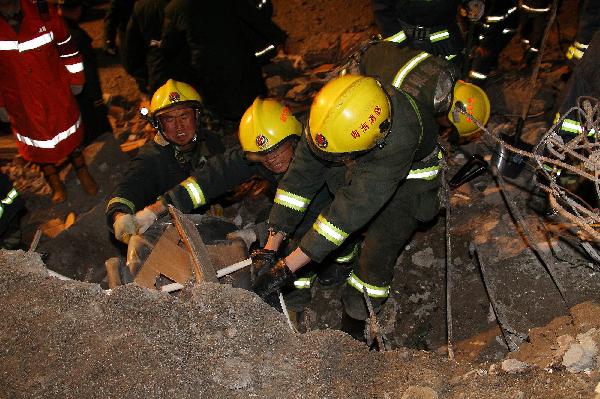Rescuers struggling to reach survivors in quake
 |
|
Rescuers work on the debris in Yushu County, northwest China's Qinghai Province, April 15, 2010. Joint efforts of the nationwide forces have been put into effect after a 7.1-magnitude earthquake hit Yushu early on Wednesday. |
Thousands of rescuers fought altitude sickness, chilly weather, strong winds and frequent aftershocks Thursday to dig through rubble and reach survivors of a strong earthquake that has left 617 dead, 9,110 injured and 313 missing in northwest China.
The 7.1-magnitude quake, which struck the Tibetan Autonomous Prefecture of Yushu in southern Qinghai Province early on Wednesday, also toppled 15,000 residential buildings and forced 100,000 residents to be relocated, according to the rescue headquarters.
Many people are still buried under the debris of collapsed houses in the hardest-hit Gyegu Town near the epicenter, the seat of the Yushu prefecture government and home to 100,000 people. It sits at about 4,000 meters above sea level.
More than 85 percent of houses in Gyegu, mostly made of mudbrick and wood, had collapsed.
In addition to professional search and rescue teams, almost 2,000 soldiers, police officers and fire-fighters were using excavators, shovels or even bare hands to comb through the debris to find survivors.
More rescuers from across the country are en route to Yushu.
DIFFICULTIES HAMPERING RESCUE EFFORTS
"Freezing weather, high altitude and thin air have all made rescue efforts difficult," said Hou Shike, deputy head of the China International Search and Rescue Team.
Some of the team's rescuers were already feeling dizzy due to low oxygen level in the air soon after arriving at the Yushu Airport Wednesday night, Hou said.
Roads linking the airport and Gyegu were blocked by landslides triggered by the quake, which hampered rescue missions, he said.
"We have begun searching and rescue operation in Gyegu overnight, and will set up a field hospital today," he said.
At the Yushu Vocational School, more than 20 bodies have been recovered, but at least 20 others are still buried in the debris.
"Perhaps because of altitude sickness, sniffer dogs did not even work sometimes," said Chang Zhiqiang, a school official who joined the rescue.
At least 774 aftershocks have been recorded in the quake zone so far, with the biggest at 6.3 magnitude.
"We pulled four men alive from the debris of the collapsed Xibeiniu Hotel within five minutes today. But frequent aftershocks brought some difficulty for the rescue operation," said Liu Xiangyang, of the China National Earthquake Disaster Relief Team.
Ren Tiesheng, deputy director of the Qinghai Provincial Seismological Bureau, warned Thursday that more aftershocks would hit the quake zone.
"Generally speaking, aftershocks will continue to happen for months or several years following a strong quake," he said.
Yushu has been a quake-prone region in history.
"According to local geological structure and previous experience, it is likely that aftershocks above 5 magnitude will hit the region, but aftershocks of 7 magnitude or close to 7 magnitude will be unlikely," he said.
TENTS, MEDICINE BADLY NEEDED
Most of the survivors have to stay in the open area Wednesday night amid freezing weather or sought temporary shelters in buildings that remained unaffected by the tremor. Some wrapped themselves up with quilts taken out from the debris, some brought their own tents and others turned on the lights of motorcycles.
Rescuers have set up dozens of tents for survivors in Gyegu, but the effort seemed far from enough.
"They are also badly in need of medicine and food," said Song Youlan, deputy secretary-general of the Qinghai Provincial Charity Federation.
Some injured survivors were threatened with wound infection as temperatures rose in daytime Thursday.
Many injured people were rushed Thursday to hospitals in Xining, the provincial capital 800 km away, by buses, privately-owned cars and planes.
But on the highway linking Yushu and Xining, sandstorms reduced the visibility to only about 100 meters in some sections Thursday, which slowed rescue efforts.
"We lack tents, we lack medical equipment, medicine and medical workers," said Zhuohuaxia, a publicity official in Yushu.
Professional rescuers, soldiers, police officers and medical workers have been dispatched to Yushu from across the country, along with tents, cotton-padded clothes, quilts, food, water, medicine, bulldozers, excavators, cranes, generators and other relief supplies.
Donations from governmental agencies, non-governmental organizations, privately-run companies or individuals are also being rushed to the quake-hit region.
"We pulled out seven pupils alive from the debris of the Khampa Central Primary School today. They are all of Tibetan ethnic group. They have good physical condition and have been sent to hospital," said Chen Guangbiao, a company's board chairman from eastern Jiangsu Province who organized 11 rescuers to Yushu.
President Hu Jintao and Premier Wen Jiabao have ordered local authorities to go all out to save the disaster-stricken people.
The State Council, or Cabinet, has set up a quake-relief headquarters, with Vice Premier Hui Liangyu as the head, to take care of disaster relief, epidemic prevention, seismic monitoring and public security.
The Yushu prefecture government has ordered that local officials must go to the forefront to save the people and they would be sacked if they fail to perform their duties well.
TIBETAN MONKS IN RESCUE OPERATION
At a collapsed marketplace, about 20 Tibetan monks dressed in maroon robes joined local residents and rescuers to search for people buried in the debris Thursday.
"Your participation in the rescue operation fully demonstrates the love of our monks and believers for the nation, religion and hometown," Chinese Vice Premier told them while overseeing the rescue operation in Yushu.
"Assistance should come from all sides when a disaster strikes," he said.
"Yushu is an ethnic and religious region, and in disaster relief, we should bring into full play the important role of religious people and people of ethnic minorities," he said.
 0
0 







Go to Forum >>0 Comments